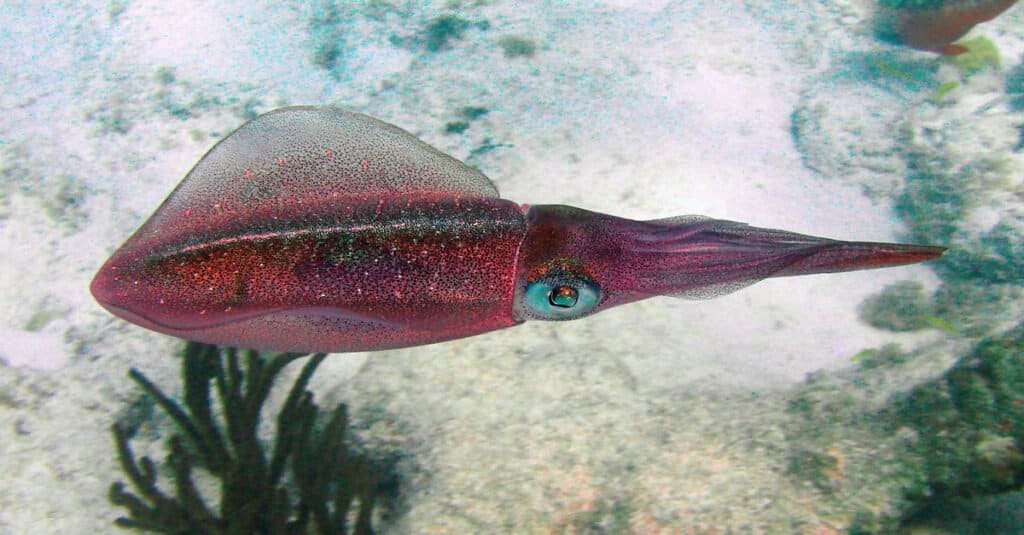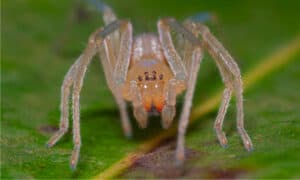Octopus vs Squid: 8 Key Differences Explained
What’s the difference between an octopus vs squid? The two cephalopods appear similar and often get confused with one another. After all, they both possess eight arms, high levels of intelligence, and can expel ink from their ink sacs and camouflage their bodies to avoid prey. However, despite these similarities, octopus and squid differ in several critical areas. If you’re skeptical, simply order a plate of calamari or octopus tentacles at a restaurant. Soon enough, you’ll realize that these ancient sea-dwelling creatures possess unique qualities that separate them from each other. In this article, we’ll compare octopus vs squid and discuss 8 key differences that you can use to tell them apart. We’ll also answer a few frequently asked questions about octopus and squid.
Comparing Octopus and Squid
| Octopus | Squid | |
| Size | 1 inch to 30 feet 1 gram to 600 pounds |
.5 inch to 43 feet Less than a gram to 1 ton |
| Mantle and Head | Round mantle and head | Triangular-shaped head and mantle Fins alongside the mantle Backbone called a “pen” |
| Habitat | Seabed, coral reefs, shorelines, and deep ocean | Open ocean and deep ocean |
| Arms | 8 arms covered with suckers No hooks or sucker rings Can be used for locomotion |
Two retractile tentacles for grabbing prey Hooks and suckers or sucker rings |
| Diet and Feeding | Crustaceans, worms, whelks, clams, prawns, fish Paralyzing or toxic saliva dissolves food |
Shrimp and fish Catch food with tentacles and hold with arms Eat prey in chunks |
| Lifespan | 1 to 3 years Up to 5 years |
1 to 5 years Up to 15 years |
| Socialization | Solitary unless mating May live in high densities Occasionally hunt with other species, typically fish |
May use light and color changes to communicate Live alone or in schools Some hunt cooperatively |
| Reproduction | Special arms called a hectocotylus transfer sperm to the female mantle cavity Females guard eggs in the den |
Mate in large groups Attach eggs to rocks or seaweed or allow eggs to float freely Don’t guard eggs |
The 8 Key Differences Between Octopus and Squid

Iman Daniel/Shutterstock.com
Octopus and Squid: Size
Overall, there is not much difference in terms of the size of octopus vs squid. However, at the extremes, more variance exists in squid species. The smallest octopus, Octopus wolfi, measures a little under 1 inch in length and weighs about a gram. Meanwhile, the giant Pacific octopus can reach up to 30 feet in length and nearly 600 pounds. While extreme, once we compare these measures to the smallest and largest squid, the difference soon becomes apparent. For example, the Thai bobtail squid is the smallest known cephalopod. It measures less than half an inch long and weighs less than a gram. On the other hand, the giant squid can reach over 43 feet long and weigh more than a ton. In essence, although octopuses tend to grow larger than squids on average, squids experience a greater range in size.
Octopus and Squid: Mantle and Head
Both octopuses and squids are head-footed animals, with most of their vital organs encased in a mantle. That said, their mantle and head look quite different when compared side-by-side. Octopuses possess a round mantle and head and look quite bulbous. Their mantles come in a range of colors and patterns, although many species use camouflage to match their environment. Except for the deep-dwelling Dumbo octopus, octopuses do not grow fins on their mantle. On the other hand, the mantle of squids is triangular-shaped. Unlike octopuses, fins grow tiny fins on either side of their mantle, which they use for locomotion and navigation. patterns and colors of squid to appear more muted, although they can also camouflage themselves when threatened.
Octopus and Squid: Habitat
There are several differences in the preferred habitat of octopus vs squid. Generally speaking, octopuses reside near the seabed. They build their dens in coral reefs, near shorelines, and along the ocean floor, both at high and abyssal depths. That said, a few species of octopus do spend a majority of their time in the open ocean, but they represent the exception to the rule. On the other hand, squids mostly live in the open ocean. As they don’t build dens like octopuses, they don’t need to dwell near the ocean floor. They occur frequently both near the surface and at abyssal depths.
Octopus and Squid: Arms
Another difference between an octopus vs squid is their arms. While they look similar at first if you take a closer look, several differences soon become apparent. On average, octopuses arms’ contain one to two rows of suckers. However, they do not develop sucker rings or hooks on the end of their arms. They use their arms to grab and hold prey, and also as a rudimentary form of locomotion when traveling across the seafloor. Meanwhile, squids may feature sucker rings or suckers on the arms. In addition, the arms of some species end in small hooks, which likely evolved to help the squid hold wriggling prey. That said, the biggest difference between the two is that squids also feature two long tentacles. Squids use their tentacles to grab prey, while they manipulate their eight arms to hold their food while feeding.
Octopus and Squid: Diet and Feeding
As previously mentioned, octopuses use their arms to catch and hold prey, while squids use their tentacles to grab prey and their arms to hold prey. However, several other differences exist between the diet and feeding behavior of octopuses and squids. Octopuses primarily subsist on crustaceans such as crabs, clams, and whelks, although some larger species will also feed on fish and shrimp. Once they catch prey, they often drag their victim back to their den. There, they will inject their food with toxic saliva using their hard beaks. This saliva paralyzes their prey and dissolves any hard outer shells, which allows the octopuses to feed on the soft inner flesh. On the other hand, squids typically feed on shrimp and small fish. Rather than rely on their saliva to dissolve their prey, they simply tear into the flesh of their meal and rip out chunks with their powerful beaks.
Octopus and Squid: Lifespan
Depending on the species, the lifespan of an octopus vs squid can differ substantially. On average, most octopuses and squids die shortly after mating, which means that their lifespans only last until they reach sexual maturity and get a chance to mate. However, between the two, squids seem to live longer in the wild. The average lifespan of an octopus is between 1 to 3 years. However, some octopuses only live for 6 months, while others can live up to 5 years. Meanwhile, most squids live between 1 to 5 years. Although some live only for 9 months, reports indicate that several squid species can live for nearly 15 years.
Octopus and Squid: Socialization
For years, scientists did not consider octopuses and squids as particularly friendly animals. This makes sense, given that they typically live solitary lives except during mating season. However, recent evidence suggests that these early assumptions only told part of the story. It’s true that most octopuses tend to live solitary lives. However, some species will live in areas with a high density of other octopuses. In addition, some species will share their den with other animals, while others will hunt cooperatively with fish. On the other hand, squids appear to be much more social than initially imagined. While some squids live solitary lives, others prefer to live in schools, such as bigfin reef squid. In addition, research indicates that other squids may be able to talk to one another. For example, reports indicate that Humboldt squids use color and lighting changes to communicate with each other.
Octopus and Squid: Reproduction
When it comes to deciding which species is the better parent, there’s no contest between octopus vs squid. Octopuses reproduce via a special arm used by the males called a hectocotylus, which transfers the male’s sperm into the female’s mantle cavity to fertilize the eggs. Females will then lay their eggs inside their dens, and aggressively guard their offspring until they are born. Some females will even go so far as to build walls to keep out potential predators. On the other hand, squids mate in large groups either through a hectocotylus or a method known as “head-to-head” mating. Rather than guard their eggs, females simply attach their eggs to rocks or seaweed. Some species don’t even bother to attach their eggs to a solid surface, and simply leave their eggs to float in the open ocean until they hatch.
Frequently Asked Questions Concerning Octopus and Squid

Ernie Hounshell/Shutterstock.com
How many species of squid and octopus are there?
There are over 300 recognized species of squid and 300 species of octopus.
How do squids and octopuses defend themselves from predators?
Squids and octopuses evolved several defense mechanisms to help defend themselves against predators. When threatened, they can shoot ink from their ink sac, which they use to distract their attackers. Alternatively, many species can camouflage their bodies to blend in with their environment, which helps them to avoid potential threats.
More from A-Z Animals
What’s the difference between an octopus vs squid? The two cephalopods appear similar and often get confused with one another. After all, they both possess eight arms, high levels of intelligence, and can expel ink from their ink sacs and camouflage their bodies to avoid prey. However, despite these similarities, octopus and squid differ in several critical areas. If you’re skeptical, simply order a plate of calamari or octopus tentacles at a restaurant. Soon enough, you’ll realize that these ancient sea-dwelling creatures possess unique qualities that separate them from each other. In this article, we’ll compare octopus vs squid and discuss 8 key differences that you can use to tell them apart. We’ll also answer a few frequently asked questions about octopus and squid.
Comparing Octopus and Squid
| Octopus | Squid | |
| Size | 1 inch to 30 feet 1 gram to 600 pounds |
.5 inch to 43 feet Less than a gram to 1 ton |
| Mantle and Head | Round mantle and head | Triangular-shaped head and mantle Fins alongside the mantle Backbone called a “pen” |
| Habitat | Seabed, coral reefs, shorelines, and deep ocean | Open ocean and deep ocean |
| Arms | 8 arms covered with suckers No hooks or sucker rings Can be used for locomotion |
Two retractile tentacles for grabbing prey Hooks and suckers or sucker rings |
| Diet and Feeding | Crustaceans, worms, whelks, clams, prawns, fish Paralyzing or toxic saliva dissolves food |
Shrimp and fish Catch food with tentacles and hold with arms Eat prey in chunks |
| Lifespan | 1 to 3 years Up to 5 years |
1 to 5 years Up to 15 years |
| Socialization | Solitary unless mating May live in high densities Occasionally hunt with other species, typically fish |
May use light and color changes to communicate Live alone or in schools Some hunt cooperatively |
| Reproduction | Special arms called a hectocotylus transfer sperm to the female mantle cavity Females guard eggs in the den |
Mate in large groups Attach eggs to rocks or seaweed or allow eggs to float freely Don’t guard eggs |
The 8 Key Differences Between Octopus and Squid

Iman Daniel/Shutterstock.com
Octopus and Squid: Size
Overall, there is not much difference in terms of the size of octopus vs squid. However, at the extremes, more variance exists in squid species. The smallest octopus, Octopus wolfi, measures a little under 1 inch in length and weighs about a gram. Meanwhile, the giant Pacific octopus can reach up to 30 feet in length and nearly 600 pounds. While extreme, once we compare these measures to the smallest and largest squid, the difference soon becomes apparent. For example, the Thai bobtail squid is the smallest known cephalopod. It measures less than half an inch long and weighs less than a gram. On the other hand, the giant squid can reach over 43 feet long and weigh more than a ton. In essence, although octopuses tend to grow larger than squids on average, squids experience a greater range in size.
Octopus and Squid: Mantle and Head
Both octopuses and squids are head-footed animals, with most of their vital organs encased in a mantle. That said, their mantle and head look quite different when compared side-by-side. Octopuses possess a round mantle and head and look quite bulbous. Their mantles come in a range of colors and patterns, although many species use camouflage to match their environment. Except for the deep-dwelling Dumbo octopus, octopuses do not grow fins on their mantle. On the other hand, the mantle of squids is triangular-shaped. Unlike octopuses, fins grow tiny fins on either side of their mantle, which they use for locomotion and navigation. patterns and colors of squid to appear more muted, although they can also camouflage themselves when threatened.
Octopus and Squid: Habitat
There are several differences in the preferred habitat of octopus vs squid. Generally speaking, octopuses reside near the seabed. They build their dens in coral reefs, near shorelines, and along the ocean floor, both at high and abyssal depths. That said, a few species of octopus do spend a majority of their time in the open ocean, but they represent the exception to the rule. On the other hand, squids mostly live in the open ocean. As they don’t build dens like octopuses, they don’t need to dwell near the ocean floor. They occur frequently both near the surface and at abyssal depths.
Octopus and Squid: Arms
Another difference between an octopus vs squid is their arms. While they look similar at first if you take a closer look, several differences soon become apparent. On average, octopuses arms’ contain one to two rows of suckers. However, they do not develop sucker rings or hooks on the end of their arms. They use their arms to grab and hold prey, and also as a rudimentary form of locomotion when traveling across the seafloor. Meanwhile, squids may feature sucker rings or suckers on the arms. In addition, the arms of some species end in small hooks, which likely evolved to help the squid hold wriggling prey. That said, the biggest difference between the two is that squids also feature two long tentacles. Squids use their tentacles to grab prey, while they manipulate their eight arms to hold their food while feeding.
Octopus and Squid: Diet and Feeding
As previously mentioned, octopuses use their arms to catch and hold prey, while squids use their tentacles to grab prey and their arms to hold prey. However, several other differences exist between the diet and feeding behavior of octopuses and squids. Octopuses primarily subsist on crustaceans such as crabs, clams, and whelks, although some larger species will also feed on fish and shrimp. Once they catch prey, they often drag their victim back to their den. There, they will inject their food with toxic saliva using their hard beaks. This saliva paralyzes their prey and dissolves any hard outer shells, which allows the octopuses to feed on the soft inner flesh. On the other hand, squids typically feed on shrimp and small fish. Rather than rely on their saliva to dissolve their prey, they simply tear into the flesh of their meal and rip out chunks with their powerful beaks.
Octopus and Squid: Lifespan
Depending on the species, the lifespan of an octopus vs squid can differ substantially. On average, most octopuses and squids die shortly after mating, which means that their lifespans only last until they reach sexual maturity and get a chance to mate. However, between the two, squids seem to live longer in the wild. The average lifespan of an octopus is between 1 to 3 years. However, some octopuses only live for 6 months, while others can live up to 5 years. Meanwhile, most squids live between 1 to 5 years. Although some live only for 9 months, reports indicate that several squid species can live for nearly 15 years.
Octopus and Squid: Socialization
For years, scientists did not consider octopuses and squids as particularly friendly animals. This makes sense, given that they typically live solitary lives except during mating season. However, recent evidence suggests that these early assumptions only told part of the story. It’s true that most octopuses tend to live solitary lives. However, some species will live in areas with a high density of other octopuses. In addition, some species will share their den with other animals, while others will hunt cooperatively with fish. On the other hand, squids appear to be much more social than initially imagined. While some squids live solitary lives, others prefer to live in schools, such as bigfin reef squid. In addition, research indicates that other squids may be able to talk to one another. For example, reports indicate that Humboldt squids use color and lighting changes to communicate with each other.
Octopus and Squid: Reproduction
When it comes to deciding which species is the better parent, there’s no contest between octopus vs squid. Octopuses reproduce via a special arm used by the males called a hectocotylus, which transfers the male’s sperm into the female’s mantle cavity to fertilize the eggs. Females will then lay their eggs inside their dens, and aggressively guard their offspring until they are born. Some females will even go so far as to build walls to keep out potential predators. On the other hand, squids mate in large groups either through a hectocotylus or a method known as “head-to-head” mating. Rather than guard their eggs, females simply attach their eggs to rocks or seaweed. Some species don’t even bother to attach their eggs to a solid surface, and simply leave their eggs to float in the open ocean until they hatch.
Frequently Asked Questions Concerning Octopus and Squid

Ernie Hounshell/Shutterstock.com
How many species of squid and octopus are there?
There are over 300 recognized species of squid and 300 species of octopus.
How do squids and octopuses defend themselves from predators?
Squids and octopuses evolved several defense mechanisms to help defend themselves against predators. When threatened, they can shoot ink from their ink sac, which they use to distract their attackers. Alternatively, many species can camouflage their bodies to blend in with their environment, which helps them to avoid potential threats.






